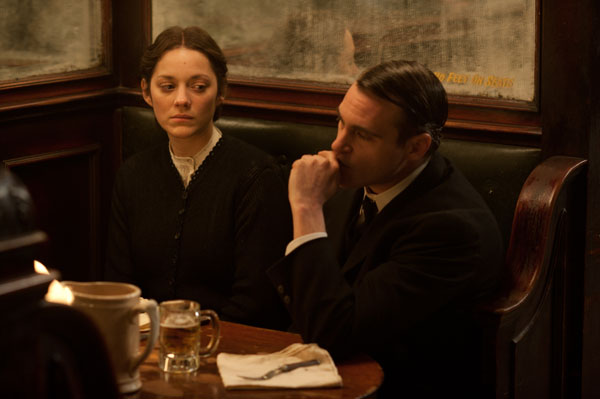“The tension between naturalism and artifice is acutely and marvelously felt in The Immigrant, James Gray’s new film, set on New York’s teeming, polyglot Lower East Side in the early 1920s,” writes A.O. Scott in the New York Times. “Marion Cotillard’s wide-eyed, furious performance as a Polish woman newly arrived in America propels the story beyond the usual melting-pot clichés, even as the setting evokes the mummery of vaudeville and Yiddish theater. Mr. Gray (Two Lovers, We Own the Night), is unafraid of melodrama, and at its best The Immigrant hums with pure, deep and complicated emotion.”
In his interview with Gray for the Notebook, a conversation that touches on Bresson and Vertigo, Twitter and the current state of cinema, 2001: A Space Odyssey and Gray’s own science fiction project, love and death, Adam Cook says: “The Immigrant almost feels like a prequel to your other films, which each told the story of a man who couldn’t escape the stranglehold of his familial bonds, and here we see the origin of those family ties and come to understand their significance and what made them something so embedded in the lives of your other protagonists. Do you recognize this as well?”
To which Gray replies: “I’ve never thought of that until you just mentioned it. Interesting, it makes sense. I guess all one tries to do is mine your own life and try to explore as much as you can what it is that made you you. Hopefully then, something textured and nuanced and emotional comes out of it. I had stolen tons of these stories from my grandparents and so forth. It makes sense now that you say it. It wasn’t conscious.”
“Though it suggests a continuation of Emanuele Crialese’s Golden Door, the story of a dirt-poor and profoundly superstitious Sicilian family’s sojourn across the angry waters of the Atlantic toward Ellis Island, The Immigrant couldn’t be more different in style,” writes Slant‘s Ed Gonzalez. “Where Crialese’s film, almost phantasmagorically shot by Agnès Godard, reflected in its bombastic aesthetic the overblown beliefs of American life that have driven countless immigrants to the United States, Gray’s period melodrama suggests a daguerreotype come to painfully sobering and stubborn life. In its stripped-down realism and blistering fixation on its main character’s grappling with life and mortality, The Immigrant feels closer in spirit to Roberto Rossellini’s collaborations with Ingrid Bergman. From its almost unrelenting focus on Cotillard’s haunted face, ever-registering Ewa’s progression to a newer understanding of the existential complexities of the world into which she’s been thrust, to its literally prismatic final shot, an epiphanous collage of Ewa and Bruno’s [Joaquin Phoenix] travels to an ostensibly hopeful tomorrow, the film is Gray’s Voyage to Italy.”
For Time Out New York‘s Keith Uhlich, The Immigrant tells a story that “builds, slowly and steadily, to a powerhouse climax that takes this fable about the treacherous undercurrents of the American Dream to masterful heights.”
Earlier: Reviews from Cannes. The Immigrant screens this evening and once again on Wednesday at the New York Film Festival.
Updates, 10/14: “The Immigrant aims not to be a strict dramatization of historical record or a definitive portrait of turn-of-the-century struggle but a finely etched melodrama of a woman’s subjugation that poignantly uses that history as a backdrop,” writes Michael Koresky at Reverse Shot. “This is not historiographical Spielberg or Scorsese territory. Rather consider it indebted to the Don Siegel of The Beguiled, the John Huston of Wise Blood, or the Jack Fisk of Raggedy Man; all of these are period dramas that take place within the crevices of their eras rather than as expressions of them.”
“The Immigrant is largely a showcase for Cotillard’s ability to suffer beautifully,” finds Jesse Hassenger at the L. “She reveals the toughness underneath Ewa’s sadness and panic, but underneath Gray’s movie is mostly just more suffering.”
Elise Nakhnikian at the House Next Door: “As he did in Little Odessa, The Yards, and We Own the Night, Gray introduces us to a dysfunctional family and a criminal subculture prone to preying on the weak, going light on narrative twists to focus on the milieu and the interplay between his main characters. But where the best of his work sweeps you up in a tide of emotion and imagery so strong you aren’t tripped up by on-the-nose dialogue or underdeveloped characters, The Immigrant sometimes makes it difficult to suspend disbelief.”
“All of Gray’s previous films have been concerned with the immigrant experience in some fashion, taking place among ethnic enclaves that preserve European cultural traditions,” writes Ben Sachs in the Chicago Reader. “The Immigrant suggests a deeper exploration of this theme, getting closer to the roots that lie beneath his other movies.”
The Immigrant is one of six films Peter Labuza and Tony Dayoub discuss in the latest Cinephiliacs podcast.
Via Michael Smith, Gray’s remarks as The Immigrant opened the Chicago International Film Festival on October 10
NYFF 2013 Index. For news and tips throughout the day every day, follow @KeyframeDaily on Twitter and/or the RSS feed. Get Keyframe Daily in your inbox by signing in at fandor.com/daily.




